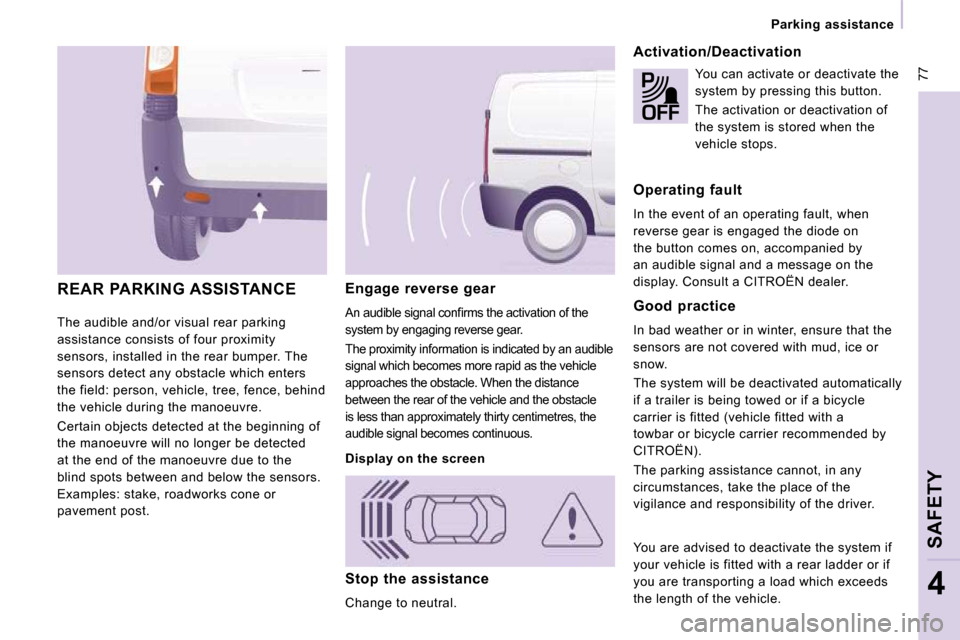Page 73 of 225

70
Rear suspension
Metal suspension
This equipment adopts long movement
limiters which make it possible to guarantee
stable behaviour both when loaded and
when empty. No action on your part is
required except to ensure that maintenance
is carried out and that the authorised loads
are complied with. irrespective of the weight of the load, within
the limit of the authorised values. On board,
the increasing or lightening of the load on the
vehicle's platform is detected by two height
sensors. When all of the doors are closed, the
sensors trigger the automatic compensation
and determine the optimum height of the sill
for the vehicle's driving conditions.
Deactivation of the automatic correction
The control which permits deactivation of the
automatic control is located on the right-
hand side, at the rear of the vehicle.
REAR SUSPENSION
You must deactivate the automatic
correction manually in the following
situations:
- when working underneath the vehicle,
- when changing a wheel,
- when the vehicle is being transported by lorry, train, ferry, boat, ...
Two types of suspension are offered.
Rear suspension with pneumatic
compensation
� �I�f� �fi� �t�t�e�d� �o�n� �y�o�u�r� �v�e�h�i�c�l�e�,� �t�h�i�s� �t�y�p�e� �o�f�
suspension regulates the variations in the
height of the rear platform of your vehicle
1. Automatic correction
2. Manual correction
1 - Automatic correction of the height of the rear sill
The pneumatic suspension automatically
regulates the variations in the height of the
rear platform of your vehicle. A red warning light on your
instrument panel flashes if the
height is not at its optimum level
and requires correction, drive
slowly until this warning light is
switched off.
The automatic compensation is temporarily
inactive:
- if a door/the tailgate is open,
- when braking or when stopped at a red light (brake pedal pressed). With the vehicle stationary:
- press and hold,
- release the control.
Return to automatic correction With the vehicle stationary:
- press and hold,
- release the control.
According to the configurations, a bleep may
be heard during these operations.
Two functions
Return to automatic correction is confirmed
by the diode which is switched off.
Deactivation is confirmed by the diode
which is lit. It remains lit for approximately
30 seconds.
Page 80 of 225

77
Parking assistance
SAFETY
4
The audible and/or visual rear parking
assistance consists of four proximity
sensors, installed in the rear bumper. The
sensors detect any obstacle which enters
the field: person, vehicle, tree, fence, behind
the vehicle during the manoeuvre.
Certain objects detected at the beginning of
the manoeuvre will no longer be detected
at the end of the manoeuvre due to the
blind spots between and below the sensors.
Examples: stake, roadworks cone or
pavement post. Engage reverse gear
�A�n� �a�u�d�i�b�l�e� �s�i�g�n�a�l� �c�o�n�fi� �r�m�s� �t�h�e� �a�c�t�i�v�a�t�i�o�n� �o�f� �t�h�e�
system by engaging reverse gear.
The proximity information is indicated by an audibl
e
signal which becomes more rapid as the vehicle
approaches the obstacle. When the distance
between the rear of the vehicle and the obstacle
is less than approximately thirty centimetres, the
audible signal becomes continuous.
Stop the assistance
Change to neutral.
REAR PARKING ASSISTANCE
Activation/Deactivation
You can activate or deactivate the
system by pressing this button.
The activation or deactivation of
the system is stored when the
vehicle stops.
Operating fault
In the event of an operating fault, when
reverse gear is engaged the diode on
the button comes on, accompanied by
an audible signal and a message on the
display. Consult a CITROËN dealer.
Good practice
In bad weather or in winter, ensure that the
sensors are not covered with mud, ice or
snow.
The system will be deactivated automatically
if a trailer is being towed or if a bicycle
carrier is fitted (vehicle fitted with a
towbar or bicycle carrier recommended by
CITROËN).
The parking assistance cannot, in any
circumstances, take the place of the
vigilance and responsibility of the driver.
Display on the screen
You are advised to deactivate the system if
your vehicle is fitted with a rear ladder or if
you are transporting a load which exceeds
the length of the vehicle.
Page 126 of 225

119
Changing a fuse
QUICK HELP
7
RIGHT-HAND SIDE FASCIA PANEL FUSES
- Tilt the storage compartment then pull it firmly to access the fuses.
Fuses A (amps) Allocation
1 15 Rear wiper
2 - Free
3 5 Airbag control unit
4 10 Steering wheel angle sensor, Diagnostic socket, ES
P
sensor, Manual ventilation, Clutch switch, Headlamp beam
height, Particle emission filter pump
5 30 Electric mirrors, Passenger electric window mot or
6 30 Front electric windows supply
7 5 Courtesy lights and glove box light
8 20 Multifunction display, Anti-theft alarm siren, Aud
io
equipment, Compact disc changer, Audio/telephone, T railer
fuse box (accessory), Coachbuilder/vehicle modifier unit
(platform cab)
9 10 Load space accessories socket
10 30 Rear ride height corrector, Steering wheel switchi
ng,
Instrument panel
11 15 Diagnostic socket, Ignition switch
12 15 Hands-free kit, Airbag control unit, Parking assis
tance
control unit
13 5 Engine fuse box, Trailer fuse box
14 15 Rain sensor, Automatic air conditioning, Instru ment panel
15 30 Locking/unlocking/deadlocking of the accesses
16 - Free
17 40 Heated rear screen, Heated mirrors
17 10 Heated mirrors only